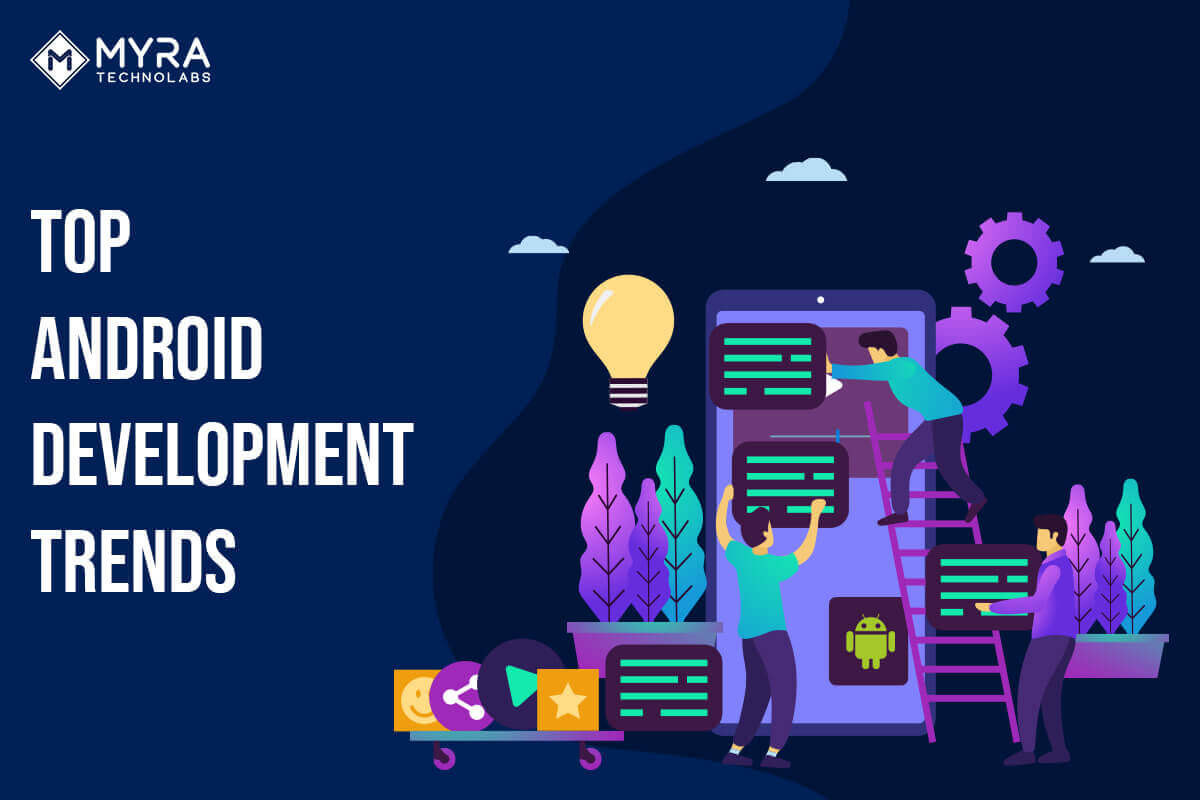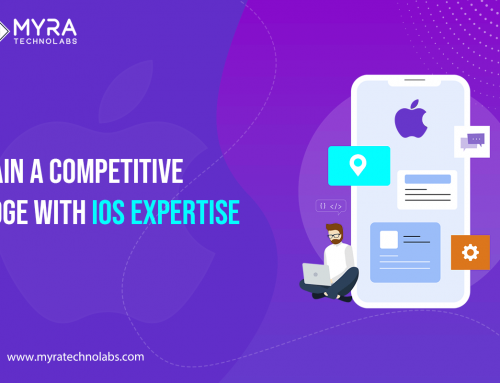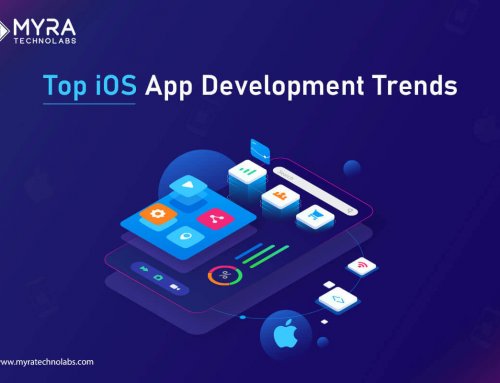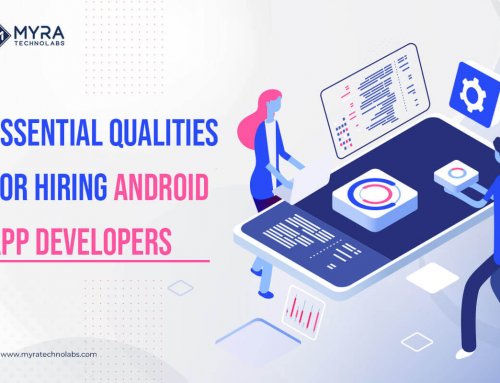The Android platform has witnessed a rapid evolution in terms of frequent new features and API updates. This has pushed developers to keep themselves up to date with the latest libraries and tools through constant learning.
New technologies and features keep coming up and developers need to follow them to build innovative, user-friendly, and secure applications. Such applications help businesses enjoy a competitive edge in the market while delivering better user experiences.
Here in this post, we will look into some key Android development trends that will be popular in 2024. Some are increasing demand for Kotlin multiplatform, adopting Jetpack Compose, AI & Machine Learning, better app security, 5G technology, the popularity of foldable devices, and much more.
Rise of Kotlin Multiplatform
Kotlin is said to play a key role in Android app development services. Developers can write shared codes using Kotlin Multiplatform and reuse them across Android, iOS, desktop, and web platforms. This helps establish consistency through code sharing while allowing developers to carry out platform-specific implementations.
The ability to share code across platforms is key to Kotlin Multiplatform’s growing popularity among developers. Apart from that, it also offers consistency while reducing code redundancies. For developers, it helps them boost productivity and streamline their workflows.
Kotlin Multiplatform is widely used in the market by some of the popular brands like:
- Netflix
- VMware
- Philips
Increased Adoption of Jetpack Compose
Jetpack Compose is a modern UI toolkit. Android developers use it to create responsive and intuitive Android UIs by leveraging a declarative approach. Its benefits include enhanced code readability, simplified UI development, faster development, ease of maintenance, and smooth integration with existing codes.
There has been a tremendous increase in the adoption of Jetpack Compose for Android app development services because of the way it simplifies Android app development. It also helps developers boost their productivity while enjoying strong support from the developer community.
In 2024, Jetpack Compose witnessed a few improvements in terms of adding in many extensions including:
- Improved performance
- Support for the transition of shared elements
- Lazy list item animations
Jetpack Compose is used for building Android interfaces of apps like Twitter and Spotify to deliver visually appealing user experiences. Apps like Slack and Trello use it to streamline workflows and boost UI responsiveness.
AI and Machine Learning Integration
- Personalization and Automation: AI and Machine Learning technologies personalize apps to automate tasks and help with better decision-making. It allows developers to come up with intuitive and powerful apps by unlocking new levels of intelligence.
- Advanced Tools and Libraries: Android developers have access to a rich ecosystem of tools and libraries. Some of the development tools that Android developers can use are Android Studio, Kotlin, and Jetpack Compose. Apart from the tools, developers also have libraries like TensorFlow Lite, firebase, Glide, Retrofit, Dagger 2, and ML Kit.
- Diverse Applications: In the case of music streaming apps, AI algorithms analyze the listening habits of users and curate playlists accordingly. Similarly, AI can be used to personalize the feeds on social media platforms and prioritize content that can enhance interactions. Fitness apps are now offering personalized workout routines with virtual coaches by leveraging AI.
- Future Possibilities: The future possibilities of Android development using AI are exciting. The use of AI-powered AI assistants will become all the more proactive. They will advise users about what they want by anticipating their needs. An Android app development company will use it to build Android applications that work towards creating a more inclusive user experience for the app users
Enhanced App Security Measures
- Robust Security Features: With cyberattacks increasing and phones storing sensitive data, it is crucial to ensure the security of Android applications. A good mobile app development company can prioritize implementing robust security features when developing Android apps to safeguard the safety and trust of users.
- Key Security Enhancements (2024): In 2024, Android came up with key security features and best practices that included end-to-end encryption of all user data and enhanced biometric authentication using fingerprint accuracy and facial recognition. Adding in regular security patch updates and bringing in stricter app permissions also offered apps better protection against potential threats.
- Google’s Security Initiatives: Google is working towards enhancing app security on the Play Store by implementing stronger app review processes. It is also trying to track down any malicious activities by leveraging advanced AI. This way Google gets to secure the Android apps available on the Play Store.
- Best Practices for Developers: To protect the sensitive data of users over the app, Android developers should follow secure coding practices. Apart from that, they should implement strong authentication methods and regularly update dependencies and libraries to patch vulnerabilities.
Foldable and Multi-Screen Devices
Foldable and multiscreen devices have risen in popularity in recent times due to the immersive user experience and multitasking capabilities they offer and can be considered one of the key Android development trends. These devices blend the benefits of all kinds of mobile and portable devices into one.
When it comes to foldable and multiscreen, Android developers face many challenges that include maintaining app compatibility across different devices & software, maintaining security, device fragmentation, etc. They also have a chance to explore newer opportunities like foldable devices and innovative technologies like AR/VR, and AI and make their way to a larger audience base.
Developers should implement adaptive and responsive layouts that can adjust with different screen configurations and sizes when trying to optimize apps for multiscreen and foldable devices. It is possible to enhance user experience across different orientations and ensure smooth transitions by making use of libraries like Jetpack and Android WindowManager.
Several innovative apps in the market make use of foldable screens today.
- Microsoft Office Suite
- Samsung Multi-Active Window
- Kindle for foldable
Expansion of 5G Technology
The emergence of 5G technology is said to impact mobile app performance positively by establishing reliable connections, lowering latency, and offering faster data speeds. This will help enhance the overall user experience by delivering real-time gaming, live streaming, IoT integration, and integrating augmented reality features.
A mobile app development company gets to design real-time experiences by leveraging the low latency and high speed of 5G. Think about the scenarios where with 5G technology cloud gaming can be highly responsive, the AR/VR experience can be seamless and data streaming can be instant.
Developers can create a variety of exciting apps using 5G technology. Some of them are:
- Cloud-based gaming app NVIDIA GeForce Now offers a gaming experience with minimal lag.
- Proximie, a telemedicine app leverages 5G to carry out remote patient monitoring, real-time consultations, etc. to let users have access to quality healthcare.
Boost Your Business with a Custom Android App
Ready to create an app that stands out? Our expert developers can help. Contact Us
Progressive Web Apps (PWAs)
PWAs are accessed over the browser and offer an app-like experience to the users. They can be accessed offline and developed with low development costs.
PWAs are one of the top trends in Android app development. PWAs are beneficial when it comes to reaching app users even offline. They benefit from strong Android support, aiding businesses and developers in creating cost-effective app solutions with a broader reach.
There are some popular examples of successful PWAs in the market and that includes Spotify, Tinder, and Starbucks.
The simple way to convert an Android app into a PWA is:
- Know whether it is suitable to translate
- Webify your Android app
- Integrate key PWA features
- Optimize the codes for performance
- Test and deploy
Wearable and IoT Integration
Wearables and IoT together are revolutionizing Android app development by offering enhanced functionality, data-driven insights, improved user experience, and streamlined automation.
Developing wearable apps requires a specific set of tools and frameworks. Some of them are:
- Android Studio
- Kotlin
- Jetpack Compose
- Flutter
- Wear Designer
- Wear OS by Google Developers
Innovation is taking center stage in the case of wearable and IoT technology. Such solutions include smart glasses, smart clothing with biometric monitoring, smart home management powered by voice assistants, smartwatches with personalized nutrition coaching, wearables with medical alerts, etc.
Wearables and IoT will together bring in innovative solutions in the future. Their growth is predicted to offer enhanced healthcare management, smarter homes and cities, wearables for mental well-being, immersive AR experiences, security & privacy, and interoperability.
Transform Your Idea into an Android App
Let our team bring your vision to life with a custom Android app. Contact Us
Improved Developer Tools and Environments
- Jetpack Compose 2.0: In 2024, Google introduced Jetpack Compose 2.0, which helped developers build UIs with enough performance improvements and robust features. Android Studio Giraffe improved build speed and made AI-based coding tools possible, while the new Android App Bundles optimized app delivery and reduced APK size.
- Android Studio Giraffe (2024.1): The latest Android Studio Giraffe (2024.1) came up with faster build times, AI-assisted code completion, and better profiling tools. Another important tool Gradle saw a reduction in overall build times and enhancement of incremental builds and dependency management. Moreover, device simulation performance and fidelity improved with the introduction of new features in Android Emulator.
- Gradle Enhancements: These development tools boost developer productivity by streamlining the coding process and using AI-assisted features for debugging, simplifying dependency management, and reducing build times. It becomes possible to build high-quality applications using better emulators and profiling tools as they help with enhanced performance monitoring and testing.
- Enhanced Emulators and Profiling Tools: Make use of the AI-assisted features of Android Studio to get the maximum out of these tools for faster coding and debugging. Again, a mobile app development company can save the build time of Android apps by using Gradle. Identify performance issues at the earliest and test the application across different devices by using emulators and enhanced profiling tools.
Focus on User Privacy and Data Protection
One of the emerging trends in Android app development is the increasing stress on data protection and user privacy. This becomes crucial as Google brings in better permission models and stricter policies for apps. Developers need to reduce data collection and come up with clear user consent and robust encryption models.
Android app development will face stricter data privacy regulations in the coming time. It will become important for developers to establish transparency on data collection and implement strong security practices as Google Play stresses the need to ensure user safety.
To ensure user privacy and compliance are maintained in Android apps, developers are required to update the app regularly and ensure it adheres to standards like CCPA and GDPR. They need to use secure data storage practices, implement data minimization, obtain consent from users before data collection, etc.
Developers can use various libraries and tools to protect Android apps, including:
- Jetpack Security
- ProGuard
- OkHttp & TLS
Conclusion
Several Android development trends are influencing app development and that includes the rise of Kotlin multiplatform, 5G technology, stress on security measures, the emergence of foldable and multi-screen devices, AI & ML, etc.
Businesses and developers need to keep up with the latest trends to deliver Android apps that can take the business ahead. If you are planning to invest in Android app development services for your business, then it would be wise to check for the trends first and ensure your app is a success.





